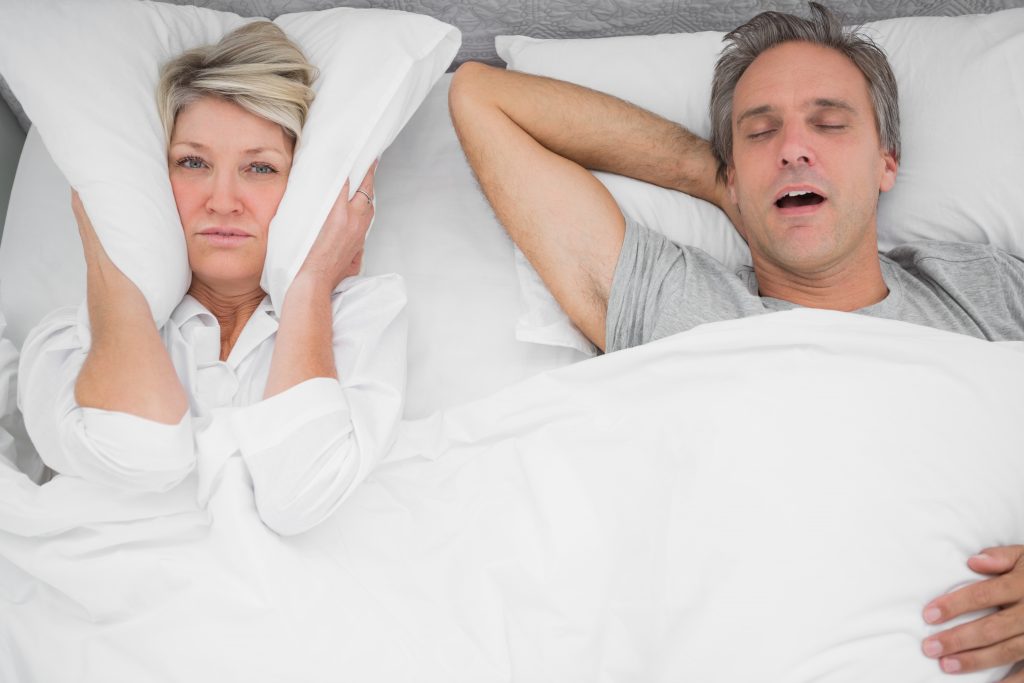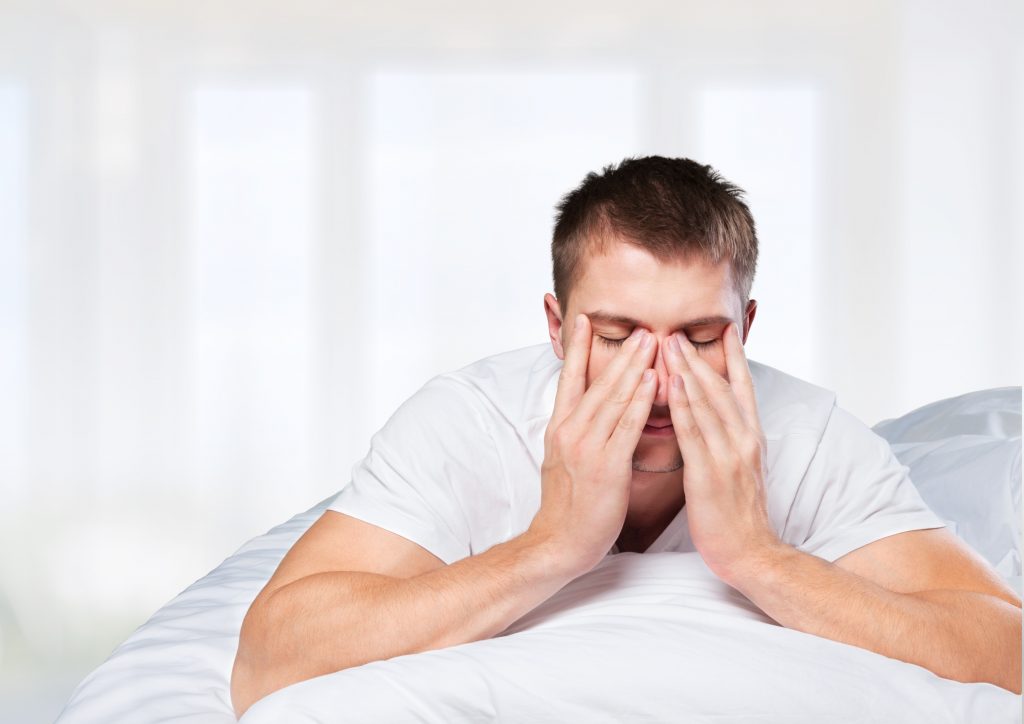January 26, 2022
What Are the Warning Signs of Sleep Apnea?
Sleep apnea is a highly common sleep disorder that causes you to stop breathing several times throughout the night. Obstructive sleep apnea is the most common type of sleep apnea.
Sleep apnea is a chronic medical condition. However, it can be effectively treated and improved by working with a sleep specialist and making healthy changes to your lifestyle.
Here’s how to tell if you have sleep apnea, and where you can find a sleep specialist or doctor who can properly treat your condition.
How Do You Know if You Have Sleep Apnea?
Sleep apnea has many different signs and symptoms. Some of these symptoms only occur at night, and may only be detectable by your sleeping partner. Other symptoms of sleep apnea occur during the daytime.
The top five warning signs of sleep apnea are:
1. Loud Snoring
Everyone snores from time to time.  However, if you tend to snore loudly all the time, or people in your household complain or tease you about your snoring, it’s possible you may have sleep apnea.
However, if you tend to snore loudly all the time, or people in your household complain or tease you about your snoring, it’s possible you may have sleep apnea.
When you fall asleep, the muscles at the back of your throat relax. This causes the tissues in your throat to partially block the airway and vibrate when you breathe.
If your airway is narrow, the airflow in your throat will likely be strong and forceful. This is what causes you to snore loudly. An airway may be narrow due to large tonsils, a long, soft palate, or excess fat tissue around the neck and throat.
Ask your sleeping partner or family members if you frequently snore loudly, especially if you think you may have sleep apnea.
2. Daytime Sleepiness
Sleep apnea causes numerous sleep disturbances throughout the night. It usually causes you to wake up repeatedly, such as when you snore too loudly or wake up gasping for air. Sometimes, you may not even remember waking up if you have sleep apnea.
All these sleep disturbances can make you feel unusually tired during the daytime. In some instances, excessive daytime sleepiness can be dangerous. It may cause you to fall asleep while driving or operating heavy machinery at work.
If you suffer from this sleep apnea symptom, you may feel confused about why you are so sleepy during the daytime, especially if you think you’ve been getting a good night’s sleep. Poor sleep can also affect your immune system to make you feel more weak, groggy, and low on energy.
3. Morning Headaches
 After a good night’s sleep, you should feel well-rested, full of energy, and ready to conquer the day. However, if you frequently wake up with morning headaches, you may not be sleeping as well as you thought. Morning headaches are a sign that you slept poorly during the night, and that you may have experienced several sleep disturbances.
After a good night’s sleep, you should feel well-rested, full of energy, and ready to conquer the day. However, if you frequently wake up with morning headaches, you may not be sleeping as well as you thought. Morning headaches are a sign that you slept poorly during the night, and that you may have experienced several sleep disturbances.
In sleep apnea, your airway is partially or fully blocked while you sleep. This reduces oxygen flow to the brain to cause morning headaches.
Even if they go away within a few minutes after waking up, morning headaches can be a major nuisance. They can also make you irritable and moody, which can set you up for a difficult day. If you wake up with morning headaches regularly and have ruled out other causes like dehydration, you may have sleep apnea.
4. Waking Up Gasping or Choking
Some people with sleep apnea experience full closure of the airway while they sleep. This can prevent them from breathing, which causes them to wake up gasping or choking for air.
You can have this symptom of sleep apnea and not know it, especially if you sleep alone and are too tired to remember it happening during the night. Perhaps you do this regularly, but attribute it to bad dreams or nightmares. If you have a sleeping partner, your gasping and choking may cause them to also wake up.
Take note of whether you ever wake up gasping for air. If you do, it may be time to meet with your doctor for an evaluation and treatment.
5. Waking Up With a Sore Throat
In sleep apnea, a partially or fully blocked airway can make it difficult for you to breathe comfortably and freely through your nose. Many people with this sleep condition will breathe through their mouths while they sleep to increase airflow. Sleeping with your mouth open can lead to a dry mouth or a sore throat, especially if the air you’re breathing is dry or cold.
A sore throat may also be caused by the irritation triggered by loud snoring.
A dry mouth or sore throat that goes away within a few minutes or hours after you wake up is usually caused by sleep apnea.
What Are Other Signs and Symptoms of Sleep Apnea?
Sleep apnea can cause other symptoms. These signs and symptoms include:
- Episodes of paused breathing during sleep
- Loud breathing

- Difficulty with concentrating during the daytime
- Falling asleep unexpectedly during the daytime
- Mood swings and changes in mood
- Depression
- High blood pressure
- Decreased sexual libido
- Insomnia
- Weight gain
- Night sweats
- Frequent nighttime urination
When It’s Time To See a Doctor
Make an appointment with your doctor if you have signs and symptoms of sleep apnea, but haven’t been formally diagnosed with this condition. The sooner you seek treatment, the sooner you can feel better overall and start getting consistent, quality sleep.
It’s time to see your doctor for sleep apnea if you:
- Snore loudly enough to wake yourself up, or you are disturbing the sleep of others.
- Frequently wake up gasping or choking for air.
- Experience noticeable frequent pauses in breathing while you sleep.
- Suffer from excessive daytime drowsiness that interferes with your usual activities.
When left untreated, sleep apnea may increase your risk for heart and eye problems and complications during surgery.
How To Know if You Have Sleep Apnea
The best way to determine if you have sleep apnea is to meet with your doctor or a sleep specialist. Your healthcare providers may recommend an in-lab sleep study where they can monitor you for sleep conditions, including sleep apnea.
Healthcare Associates of Texas is home to a large team of board-certified medical professionals who can work with you to diagnose and treat sleep apnea. Visit our website today to find the nearest location and request an appointment.
DISCLAIMER
The information featured in this site is general in nature. The site provides health information designed to complement your personal health management. It does not provide medical advice or health services and is not meant to replace professional advice or imply coverage of specific clinical services or products. The inclusion of links to other web sites does not imply any endorsement of the material on such websites.